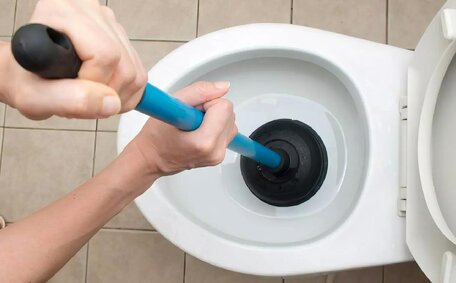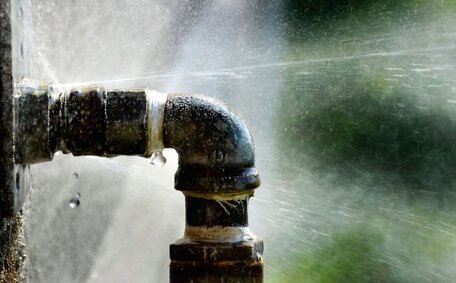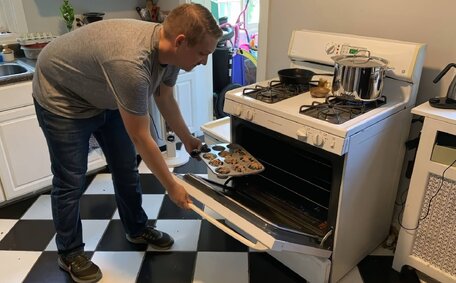What is Hard Water and How is it Measured?
Hard water contains high levels of calcium and magnesium, which impede soap lathering, making it challenging to clean effectively.
Water hardness is measured in grains per gallon (gpg) or milligrammes per litre (mg/L), reflecting the concentration of minerals. The commonly accepted water hardness classifications are as follows:
- Soft: Less than 1 gpg (17 mg/L)
- Slightly Hard: 1 to 3.5 gpg (17 to 60 mg/L)
- Moderately Hard: 3.5 to 7 gpg (60 to 120 mg/L)
- Hard: 7 to 10.5 gpg (120 to 180 mg/L)
- Very Hard: Over 10.5 gpg (Over 180 mg/L)
The water supply in Brighton-Le-Sands, Sydney tends to be moderately hard, averaging around 140mg/L or 8 gpg.
Identifying Signs of Hard Water in Your Home
There are several observable signs that can indicate hard water in your Brighton-Le-Sands home:
- Scale buildup - Hard water leaves white or grey hard water deposits on sinks, tubs, showers and other fixtures. You may notice scaling on chrome bathroom fittings.
- Spotty dishes - Dishes washed in hard water may develop film or spotting.
- Soap scum - Bathing with soap in hard water leaves an insoluble film on your skin and bathtub.
- Dry skin/hair - Hard water hot makes it harder to lather soap and wash products, potentially impacting your skin hair, causing dryness.
- Stiff laundry - Clothes washed in hard water may become rough and stiff over time.
Recognising these signs is crucial to identifying and mitigating the effects of hard water on your home appliances.
How Hard Water Impacts Hot Water Systems
The effects of hard water can be quite negative on hot water systems in Brighton-Le-Sands homes and businesses:
- Heating hard water triggers the precipitation of calcium and magnesium, forming solid limescale deposits inside tanks and pipes of water heaters. This limescale, which can build up intensely, reduces heat transfer efficiency.
- Limescale also builds up on your heating elements and heat exchangers inside water heaters. This insulating barrier makes the heater work more intensively during the water heating process, leading to higher energy expenses.
- Scale from hard water can clog the components of tankless heaters, diminishing both water pressure and flow rate.
- Corrosion and component damage caused hard water mineral deposits can affect elements like the pressure relief valve, heating elements, pipes, and storage tank over time, ultimately shortening the lifespan of hot water systems.
- Accumulated sediment and limescale require frequent maintenance through tank flushing and pipe descaling. Neglecting regular maintenance can lead to early system failure due to mineral deposit accumulation.
Installing water softeners can keep your plumbing heating system free from limescale buildup and associated effects in local homes and businesses.
Limescale Buildup and Efficiency Loss
As minerals from hard water build up inside the tank and pipes of hot water systems, home can experience reduced heating efficiency in several key ways:
- Limescale forms an insulating layer inside your hot water system’s tank, hindering heat transfer. More energy is required to heat water due to poor heat conductivity.
- Heating elements and heat exchangers become coated, which affects your water heater and forces the unit to work harder to maintain temperature.
- In tankless systems, limescale clogs internal components and water pathways, decreasing flow rates.
- Excess energy consumption drives up your utility costs in monthly bills for local households and businesses.
Signs of reduced efficiency are longer wait times for hot water, lukewarm showers and increased energy bills. Combatting this issue may require annual flushing and professional descaling of the hot water heater.
Corrosion and Damage
Hard water can damage metal components within Brighton-Le-Sands’ hot water systems. As water is heated, the impact of hard calcium and magnesium precipitate out but remain acidic, attacking plumbing metals over time.
Corrosion commonly results in:
- Pitting and leaks in copper pipes and tanks
- Rusting of steel water heater tanks
- Wear and mineral staining of your faucets and other fixtures
Furthermore, sediment buildup also abrades your water heater’s crucial system components. To mitigate corrosion:
- Flush heaters annually to remove mineral deposits from the bottom tank’s lowermost point
- Check anode rods in tanks every 2-3 years
- Consider installing a water softener or conditioner
Unchecked corrosion shortens water heater life expectancy and risks home damage through potential leaks. Being proactive to protect your water heater protects your investment and home.
Noisy Operation and Strange Sounds
Hard water buildup can cause unusual noises from your hot water system. As limescale can accumulate within the tank and pipes from using water, you may hear:
- Knocking, rumbling or banging noises as sediment-laden water flows
- Hissing or squeaking from water forcing past limescale deposits
- Rattling of a loose heating element coated in mineral buildup
If you’re wondering 'What do I do if my water heater develops new sounds?', try draining 2-3 gallons to clear sediment that may build up at the bottom. Descale the unit if noise persists after flushing your water heater. Seek professional repair for rattling heating elements, clicks or loud banging which could indicate component failures.
Fixing the underlying hard water problem with a water softener install will help restore quiet operation and extend the working life of your hot water system.
Reduced Lifespan
Over time, as limescale builds up, the negative impacts of hard water can significantly reduce the lifespan of hot water systems in Brighton-Le-Sands homes and businesses.
Limescale buildup and corrosion can ravage essential components located inside water heater structures, such as heating elements and storage tanks. Sediment can also abrade pipes and valves. This situation induces more regular breakdowns and the necessity for costly repairs or complete system replacements.
Repeatedly fixing or replacing water heaters due to hard water can be costly for homeowners. Hot water system failures also cause inconvenient disruptions to daily life.
For business owners, emergency plumbing and new hot water system costs can negatively impact profits. Having an out-of-service hot water supply affects business operations and customer satisfaction.
In various environments, resolving foundational problems with hard water through softening or scale prevention enhances efficiency lifespan and safeguards your hot water system investment.
Troubleshooting Common Hard Water Issues
The presence of your home hard water can cause a variety of issues for residents and businesses in Brighton-Le-Sands. Here are some troubleshooting tips:
Low Water Pressure
Inspect faucet aerators and showerheads for mineral buildup that clogs small openings. Soak in vinegar, then scrub clean.
Noisy Water Heater or Pipes
Drain 2-3 gallons from the tank bottom to remove sediment. If issues continue, descaling might be necessary.
Dry skin and hair
Install a showerhead filter. Use a clarifying shampoo once a week. Apply moisturiser after washing.
Addressing Stiff Laundry
Run a hot water cycle with 2 cups of vinegar to eliminate soap residue. When washing, use a water conditioner or non-detergent booster.
Removing White Scale from Fixtures
Remove built-up limescale deposits using a descaling solution tailored for the mineral content in Brighton-Le-Sands’ water supply.
For ongoing hard water problems, installing a whole-home water softener is the most effective solution for your plumbing system. This will protect your plumbing system and your plumbing appliances while giving you clean, conditioned water.
Preventing Hard Water Damage
There are several effective methods Brighton-Le-Sands residents can employ to prevent hard water damage to hot water systems and plumbing:
- Install a water softener or conditioner to remove the specific hardness minerals found in your area. This will remove minerals before they enter your pipes.
- Use polyphosphates as scale inhibitors in your system. These prevent mineral crystals from bonding, which could turn your water heater hard with lime scale.
- Replace old galvanised steel pipes prone to corrosion with PEX or copper piping.
- Insulate hot water lines to reduce condensation and mineral precipitation during transport.
- Flush hot water tanks annually to clear any sediment buildup before it causes abrasion damage.
- Have an electrician adjust your water heaters temperature setting. Lowering to 49C reduces scale formation.
Being proactive mitigates the impact hard water has on your plumbing investments and avoids the inconvenience of repairs. Preventing scale buildup also improves efficiency and can lower operating costs.
Installing a Water Softener
Implementing a water treatment system such as a water softener is highly recommended for homes and businesses in the Brighton-Le-Sands area contending with hard water issues. Water softeners remove minerals like calcium and magnesium by passing water through resin beads in an ion exchange process.
Benefits of installing a water softener include:
- Prevents limescale buildup in pipes, fixtures and hot water systems - extending their lifespan
- Restores efficiency, so your water heater can operate with reduced energy costs
- Protects plumbing from corrosion damage
- Provides cleaner water for appliances including washing machines, fixtures, laundry, cleaning etc.
- Alleviates problems like spotty dishes, stiff laundry, dry skin
When installing a softener, work with a licenced Brighton-Le-Sands plumber to:
- Test water hardness and select an appropriate softener model
- Determine optimal location with water, drain and electric connections
- Adjust settings and salt dosage for local water chemistry
- Provide ongoing service that can help maintain the system’s effectiveness
While water softener systems involve some investment upfront, they will save money over time by tackling hard water issues. This prevents costly damage and repairs down the line while improving water quality and enjoyment in your home or business.
Using a Water Conditioner
Water conditioners offer an alternative solution to traditional water softeners for managing hard water issues in Brighton-Le-Sands homes and businesses.
Unlike softeners which remove minerals, conditioners use chemicals like polyphosphates to prevent limescale formation. The minerals remain in the water, but cannot bind together to form scale.
Water conditioners are well-suited for properties with:
- Moderately hard water
- Older galvanised piping prone to corrosion
- Tankless water heaters or combo heating systems
- Residents wanting to retain water mineral content
Water conditioners protect plumbing from scale buildup and corrosion without removing beneficial calcium and magnesium ions. This helps avoid potential health issues linked to very soft water consumption.
By stopping limescale before it starts, conditioners improve efficiency and lifespan of hot water systems. They require less maintenance than softeners, using an automatic timer to inject treatment chemicals.
Installing a water conditioner with the help of a specialist Brighton-Le-Sands plumber provides an alternative for controlling hard water damage suited to certain home requirements.
Regular Maintenance and Descaling
Regular maintenance is essential to maximise the efficiency and longevity of hot water systems in hard water areas like Brighton-Le-Sands. For tank-style heaters, draining 2-3 gallons from the bottom your tank every 6 months mitigates the impact hard water may have by clearing sediment before it can abrade components. Limescale descaling using citric acid solutions tailored to your water hardness helps recover heat transfer and flow.
A maintenance flush at least once year is likewise encouraged. This should be done as needed based on scale accumulation.
Tankless heaters need routine descaling because of their compact waterways, and annual heat exchanger flushes prevent mineral blockages. Tankless heaters need routine descaling because of their compact waterways, and annual heat exchanger flushes prevent mineral blockages.
Our licenced Brighton-Le-Sands plumbers can assist with technical servicing and parts replacements inside your water heater to extend operational lifespans.
Prolonging the Life of Your Hot Water System
Residents of Brighton-Le-Sands can take proactive measures to prolong the life of hot water systems despite facing hard water challenges.
A water softener or conditioner tailored to your home’s water hardness level can prevent limescale by filtering out minerals. This prevents efficiency losses and damage to system components.
Annual tank draining, descaling pipes, and replacing anode rods are essential maintenance tasks to prevent sediment buildup. This protects tanks and valves from abrasion corrosion.
Lowering heater temperature to 49°C reduces the risk of mineral precipitation. Insulating hot water lines also reduces scale formation.
Upgrading to scale-resistant PEX or stainless steel plumbing improves lifespan. Our licenced Brighton-Le-Sands plumbers can advise on ideal system materials and help size units for optimal operational longevity given local water quality challenges.
These preventive measures help avoid costly future repairs and business revenue losses due to hot water outages. Protecting system health improves reliability, efficiency and customer satisfaction.
The Cost of Hard Water on Efficiency
Hard water buildup significantly impacts the efficiency and operating costs of hot water systems in Brighton-Le-Sands homes and businesses. As insulating limescale accumulates, heat transfer is reduced by up to 27%.
Heaters exert more effort, consuming additional energy to sustain hot water supply, leading to increased utility bills. Replacing old, inefficient water heater models is also a costly exercise averaging $1,800 for households.
By installing water softeners or conditioners, you may save more than just the financial drain of repairs and part replacements, including avoiding increased utility expenses. Well-maintained hot water systems also have better lifespans and reliability.
Treating hard water problems improves efficiency, which can lower heating costs and protect system investments for both residents and business owners in the Brighton-Le-Sands area.






